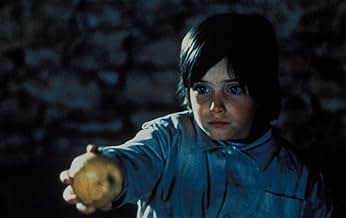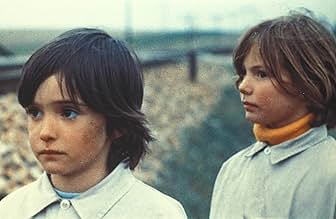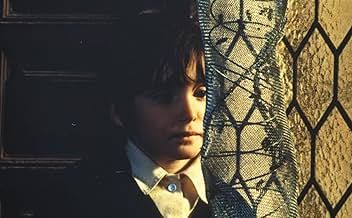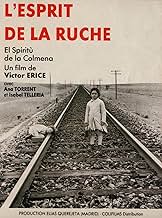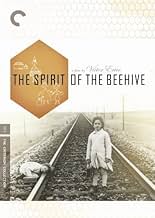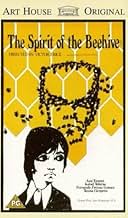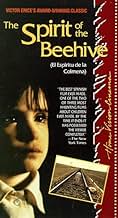Em 1940, após assistir e ser traumatizada pelo filme de Frankenstein, uma sensível menina de sete anos, que mora em uma pequena aldeia espanhola, entra em seu próprio mundo de fantasia.Em 1940, após assistir e ser traumatizada pelo filme de Frankenstein, uma sensível menina de sete anos, que mora em uma pequena aldeia espanhola, entra em seu próprio mundo de fantasia.Em 1940, após assistir e ser traumatizada pelo filme de Frankenstein, uma sensível menina de sete anos, que mora em uma pequena aldeia espanhola, entra em seu próprio mundo de fantasia.
- Direção
- Roteiristas
- Artistas
- Prêmios
- 7 vitórias e 1 indicação no total
- Direção
- Roteiristas
- Elenco e equipe completos
- Produção, bilheteria e muito mais no IMDbPro
Avaliações em destaque
While there is definitely a point to be made that this film is, first and foremost, a haunting look at the innocence of childhood, the subversive political meaning was something which is primarily the result of an attempt on my behalf to tie all the loose ends together, and the conclusion below is something I arrived at based on my own personal understanding of the narrative.
On the surface, The Spirit Of The Beehive is about a family which attempts to cope with the aftermath of the Spanish Civil War. It bears mentioning that the fact that this film even dares to address the conflict in such a direct manner suggests that, two years before Franco's death, the tight censorship regime in Spain was slowly but surely loosening its grip of the domestic film industry. Up to that point many films made in Spain during the Franco era were only able to address the civil war or Franco's regime in a strongly metaphorical manner or via subversive narratives (a case in point being much of Bunuel's work, albeit done in exile, or Saura's La Caza). In fact, much of Spanish cinema during that point in history can be regarded as an excellent case study in how allegories can be used as a way of averting tight censorship.
That said, political commentary on a tangible level would not have passed the censors even at such a late stage in Franco's reign, and thus most of the criticism in ...Colmena is driven by a sense of mutual understanding between spectator and narrative. The start of the film is a case in point: a shot of a few children watching James Whale's Frankenstein (with the narrator proclaiming that "You are about to see a monster") is followed by a cut to the girl protagonist's (Ana's) father. For now assuming that this narrative is driven exclusively by metaphors, does Victor Erice suggest, with that cut, that the girl's father is the "monster" in question? Or, does he, on a more profound level equate the word father to monster? Franco called himself the "father of the nation", and with that knowledge in mind an audience could easily read that scene as a highly ambiguous, yet still extremely effective, criticism of Franco (ie. suggestively calling Franco a monster). However, due to its strongly ambiguous nature, not a single censor would be able to pinpoint that scene and say, without any discernible doubt, that this is indeed the case. It's a wonderful example of allegorical film-making, and how film techniques can be generally used to make an intrinsic statement which relies as much to the techniques applied as it does on the audience's intelligence and ability to understand the more profound meaning behind the images.
I remember once reading the viewpoint that Ana herself represents the Spanish nation, and I can see what the intention of that statement is when you consider the monster=Franco equation I outlined above. The monster Ana meets in her daydreams (as she imagines meeting the Boris Karloff figure she saw at the Frankenstein screen) is a figure which lulls her into a false sense of security and turns out to be a threatening presence; and the symbolism itself becomes very plain once the monster=Franco and Ana=Spain (though I'll admit that this is not the most original reading of the film, and aditionally one which doesn't even begin to scrape at the amount of symbolism apparent).
If only Erice was as prolific as he is imaginative, since El Espiritu De La Colmena makes up for only one third of his entire output in over thirty years (his other two films being the equally brilliant El Sur and Quince Tree Of The Sun). Needless to say, it's cinematic genius, and a flawless work of art bar none.
We can give an alternative name to this movie as "the spirit of the house", for the director tries to show what is going on in this house whose windows resemble to honeycombs. Erice deliberately chooses not to give any shots with all members of the family, as there is serious feeling of alienation between father and mother, and total lack of communication and affection between them, and from them towards their children. Under that situation the only person whom Ana could touch with her words, plays and questions is her sister Isabel. Their house looks like a beehive with the queen bee, male worker bee, and child bees performing their duties only by being in the same house without touching to each other.
When Ana's best friend and her sister played on her trust and fears by deceiving her, she totally turned inward and found the image and the dream of Frankenstein ready for her friendship and to give her feeling of closeness. After she met the wounded Republican soldier, her Frankenstein's image came into being in his existence, who is considered as dangerous and outside the society by adults just like in the original Frankenstein movie. Like the girl in the latter, Ana does not see the fugitive as how adults define Frankenstein, as something to be run away from. Instead, she considers him as Frankenstein who could be her friend. I see the shadow of the "monster" on this movie used beautifully and magically by the director.
During the 97 minutes of the movie, Erice and his cinematographer Luis Cuadrado both reflect the heart of a child to us with their magical scenes, and skillfully convey the grey feeling of the civil war in the background without straightforwardly pointing their fingers to it.
Você sabia?
- CuriosidadesCinematographer Luis Cuadrado was going blind at the time this film was made. An assistant would take Polaroids of the scenes and Cuadrado would direct the lighting by looking through a magnifying glass at these pictures. In 1980 Cuadrado committed suicide after he went completely blind and the tumor in his brain became too painful to face.
- Erros de gravaçãoWhen the fugitive jumps from the train and rolls down the hill, he's wearing boots, but in the next shot he's wearing low-cut shoes.
- Citações
Ana: [unable to sleep] Isabel?
Isabel: [opening her eyes] What?
Ana: [whispering] Tell me what you were going to tell me.
Isabel: [whispering] About what?
Ana: The movie.
Isabel: Not now... Tomorrow.
Ana: Now... You promised. Why did he kill the girl, and why did they kill him after that?... You don't know - you're a liar.
Isabel: They didn't kill him, and he didn't kill the girl.
Ana: How do you know? How do you know they didn't die?
Isabel: Everything in the movies is fake. It's all a trick. Besides, I've seen him alive.
Ana: Where?
Isabel: In a place I know near the village. People can't see him. He only comes out at night.
Ana: Is he a ghost?
Isabel: No, he's a spirit.
Isabel: Like the spirit Dona Lucia talks about?
Isabel: Yes, but spirits have no bodies. That's why you can't kill them.
Ana: But he had one in the movie. He had arms and feet. He had everything.
Isabel: It's a disguise they put on when they go outside...
Ana: If he only comes out at night, how can you talk to him?
Isabel: I told you he was a spirit. If you're his friend, you can talk to him whenever you want. Just close your eyes and call him... It's me, Ana... It's me Ana...
[they hear what sounds like ominous footsteps and are silent]
- ConexõesFeatured in Sus años dorados (1980)
- Trilhas sonorasOjos verdes
Written by Salvador Valverde (as Valverde), Rafael de León (as León) y Manuel L. Quiroga (as Quiroga)
Principais escolhas
Detalhes
- Data de lançamento
- País de origem
- Central de atendimento oficial
- Idioma
- Também conhecido como
- The Spirit of the Beehive
- Locações de filme
- Hoyuelos, Segovia, Castilla y León, Espanha(Town and exteriors)
- Empresas de produção
- Consulte mais créditos da empresa na IMDbPro
Bilheteria
- Faturamento bruto mundial
- US$ 190.734
- Tempo de duração
- 1 h 38 min(98 min)
- Mixagem de som
- Proporção
- 1.66 : 1

![Assistir a Tráiler [OV]](https://m.media-amazon.com/images/M/MV5BZDcyMjExODEtZGJlYy00MGNmLWJhZTItNzQ5MTNjNzAzNDQ2XkEyXkFqcGdeQXRyYW5zY29kZS13b3JrZmxvdw@@._V1_QL75_UX500_CR0)
